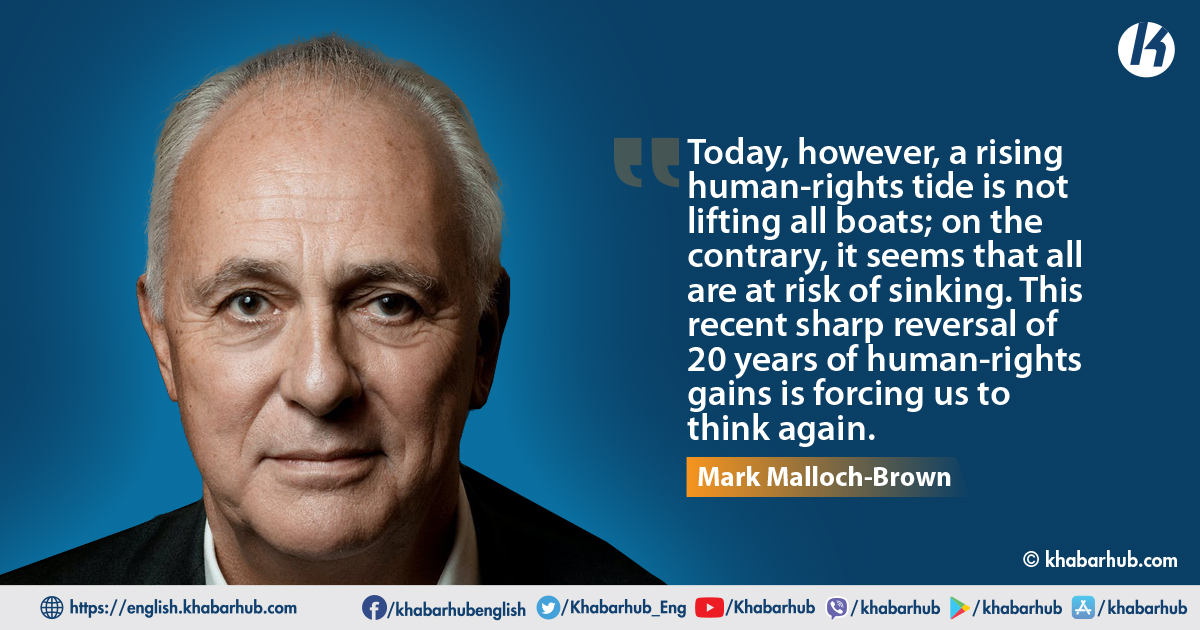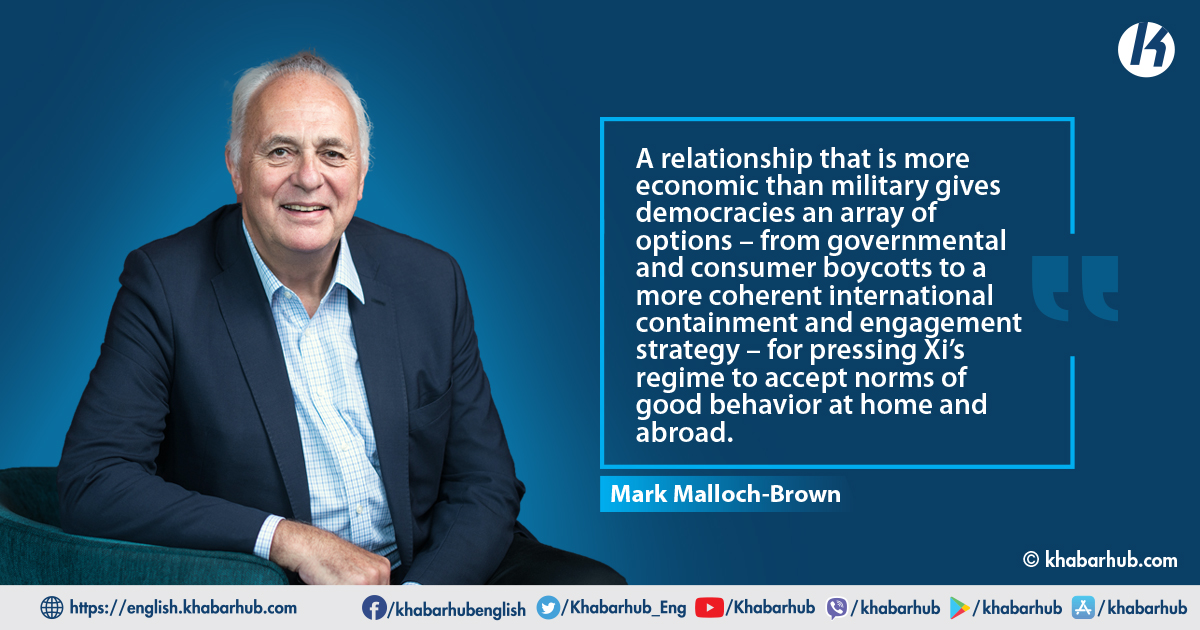Democracy is back on policymakers’ minds. US President Joe Biden plans to host a summit on the theme, and invitations to a host of events on democracy and human rights fill my inbox.
This renewed focus is not good news. Rather, it reflects the erosion of both democracy and respect for human rights in recent years.
Freedom House reports that less than 20% of the world’s population now live in what it categorizes as fully free societies, the lowest share in more than a quarter-century. Many countries are drifting steadily toward authoritarianism.
Freedom is in trouble for well-known reasons. In many countries, increasing inequality and marginalization of different groups has fueled an embrace of right-wing (and in some cases left-wing) authoritarianism.
As the world grapples with rapid technological change and economic restructuring, many are far from convinced that democracies have the edge in terms of adaptation and forward-looking policymaking. The pandemic – which many democracies mishandled – deepened these doubts.
These are difficult times for those of us who profoundly believe that the absolute, non-negotiable basis of good government is a free, democratically empowered citizenry protected equally under law.
In 1980s Eastern Europe, the problem was sclerotic, aging communist governments that could no longer deliver for their people. Today’s situation is more complicated.
I am president of the largest private philanthropy in this domain. If we are honest with ourselves, we know that our traditional models of advancing democratic values and institutions are struggling.
The Open Society Foundations (OSF) was founded in the 1980s on the assumption that there was an urgent global public demand for freedom, and that a growing number of governments around the world were embracing its rules and norms.
That allowed us (in partnership with local activists) to use a mixture of shaming and encouragement to persuade governments to adopt and respect human-rights laws and democratic procedures.

Whether our work concerned the Roma in Central and Eastern Europe, LGBTQI communities in Africa, ethnic minorities in South and East Asia, women’s rights in Latin America, or worldwide migrant and refugee protection, it seemed that we were pursuing a historic mission. And one day, that pursuit might lead to all individuals enjoying full and equal rights and opportunities.
Today, however, a rising human-rights tide is not lifting all boats; on the contrary, it seems that all are at risk of sinking. This recent sharp reversal of 20 years of human-rights gains is forcing us to think again.
As a foundation chaired to this day by its founder, George Soros – a survivor of Nazism and a refugee from communism in his native Hungary – we will not move on to less challenging issues.
After all, Soros started the foundation when prospects for human-rights advances looked as difficult as they do today.
Presidents stole additional terms, official corruption surged, and agreements between states brushed aside people’s rights. Nowadays, human-rights defenders and those who support them are not welcome in much of the world.
So, the mission is non-negotiable. But we must revisit our approach. We must ask how to recover public support for democratic and human-rights norms, while also identifying more clearly the enemies of open societies and what will lead them, even grudgingly, to respect their obligations again.
In 1980s Eastern Europe, the problem was sclerotic, aging communist governments that could no longer deliver for their people. Today’s situation is more complicated.
True, a bipolar world again threatens freedom. Biden’s forthcoming Summit for Democracy is in part an effort to rally like-minded governments but also the wider world against Chinese President Xi Jinping’s authoritarianism. That may mean democracies have some uncomfortable bedfellows as pragmatism risks trumping values.
A dense web of trade, investment, education, and technology links mean China is tied to the West, and vice versa, in ways that the Soviet Union never was.
A relationship that is more economic than military gives democracies an array of options – from governmental and consumer boycotts to a more coherent international containment and engagement strategy – for pressing Xi’s regime to accept norms of good behavior at home and abroad.
Leaders on both sides will frame this contest primarily in terms of economics, but human rights can also be a big winner – or a big loser.
Soros has always called OSF’s work “political philanthropy.” What he means is that we need to engage with the wider dynamics of change and find entry points to champion our issues.
Whereas strong states were the sole or leading human-rights violators during the Cold War, today’s world is one of multidimensional human-rights menaces. Inequalities exacerbated by unregulated transnational financial and corporate power, together with dramatic shifts in individual states’ fortunes, are creating an ever more challenging landscape. The world is becoming more unequal – and angrier.
Many view the renewed attention to deep-seated institutional racism in the United States and around the world – and the recognition that marginalization based on race, gender, religion, and class is often mutually reinforcing – as exposing the limits of a human-rights agenda.
That anger is amplified (and fueled) by social-media platforms where polarization, abuse, and lies undermine trust in institutions. A technology that many saw just a few years ago as an enabler of citizens’ rights has become in many cases a tool for manipulating minds and closing societies.
The insidious copycat behavior that Donald Trump’s four-year presidency allowed and encouraged in regimes around the world accelerated a crisis of respect for the rule of law and human rights.
Presidents stole additional terms, official corruption surged, and agreements between states brushed aside people’s rights. Nowadays, human-rights defenders and those who support them are not welcome in much of the world.
Yet malign governments and globalization, with its unintended financial and corporate consequences, are only half the problem.
Many view the renewed attention to deep-seated institutional racism in the United States and around the world – and the recognition that marginalization based on race, gender, religion, and class is often mutually reinforcing – as exposing the limits of a human-rights agenda. Human-rights remedies, victims argue, have scratched the surface, not reached the roots.
Human-rights work needs to become more political: tougher and smarter in its attacks on oppressors, and clearer about being on the side of the oppressed.
We need to address the challenges people actually face, looking beyond narrow political rights to address the deeper causes of economic and social exclusion.
(Mark Malloch-Brown, a former deputy United Nations secretary-general and co-chair of the UN Foundation, is President of the Open Society Foundations)
Copyright: Project Syndicate, 2020









Comment